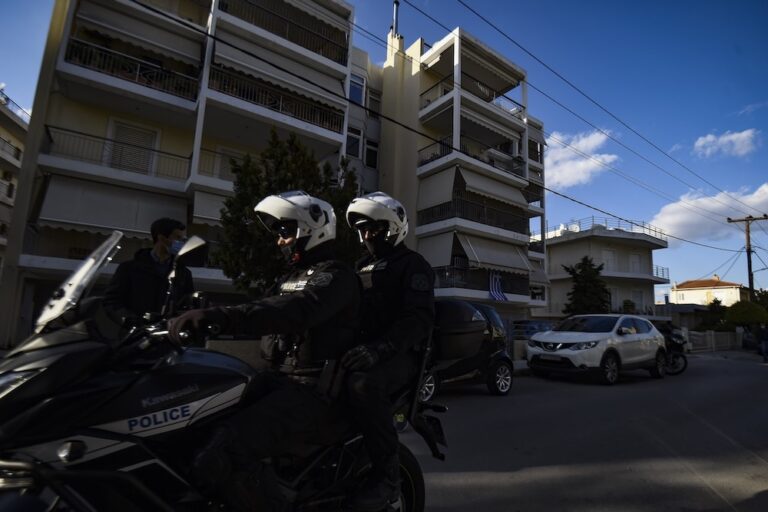Hate crime reform in Greece should focus on tackling racist and xenophobic violence, not criminalizing speech or ideas, Human Rights Watch says. Justice Minister Haralambos Athanassiou announced on October 3, 2013, that he would introduce an anti-racism bill in Parliament in the coming days.
Hate crime reform in Greece should focus on tackling racist and xenophobic violence, not criminalizing speech or ideas, Human Rights Watch said on 9 October 2013. Justice Minister Haralambos Athanassiou announced on October 3, 2013, that he would introduce an anti-racism bill in Parliament in the coming days.
“Scores of migrants and asylum seekers in Greece have been chased down the streets, beaten, and stabbed,” said Judith Sunderland, acting deputy director of the Europe and Central Asia division at Human Rights Watch. “Preventing and prosecuting this violence, and protecting the victims, should be the Greek government’s priority.”
The plan for a new hate crimes bill comes amid a crackdown on the far-right anti-immigrant party Golden Dawn, sparked by the killing on September 18 of a 34-year-old anti-fascist activist and rapper, Pavlos Fyssas. The main suspect is alleged by prosecutors to be a member of Golden Dawn.
The party leader, Nikolaos Michaloliakos, and five other members of parliament from the party have been indicted on the charge of creating and participating in a criminal organization linked to a range of offenses, including the fatal stabbing of Fyssas and several violent attacks on migrants. Michaloliakos and the others deny the charge and any connection to the incidents. Prosecutors have asked parliament to lift the immunity of three more Golden Dawn members of parliament on the same charge.
Human Rights Watch has not seen a copy of the bill, which has yet to be made public. A previous draft, initiated by then-Justice Minister Antonis Roupakiotis in May, rightly included provisions to protect from deportation the victims of crimes and major witnesses, as well as their families, during the police investigation and prosecution.
But the draft bill also envisioned tougher criminal sanctions for hate speech, including genocide denial, and would have given the justice minister the authority to ban groups if its members committed those offenses. Such provisions would raise concerns about undue restrictions on freedom of speech and association, Human Rights Watch said. The bill was not submitted to a vote because of disagreement over its scope among parties in the then governing coalition.
The new draft law should focus on strengthening the criminal justice response to racist and xenophobic violence, Human Rights Watch said. The government should ensure that the draft law includes provisions to require mandatory investigation and public prosecution of suspected hate crimes, without requiring victims to pay a €100 fee to file their complaint, a feature of current law that deters some victims of racist attacks from filing a report.
The bill should also explicitly protect undocumented migrant victims and witnesses from detention and deportation, fear of which deters them from reporting attacks to the police, Human Rights Watch said.
“Criminal acts, including direct incitement and orchestration of violence, should be diligently investigated and prosecuted to the fullest extent of the law,” Sunderland said. “But hateful ideas are best addressed through social condemnation, not criminal sanction.”
Investigations into the alleged involvement of Golden Dawn members in extremist violence should respect fair trial standards, including the presumption of innocence and the right to an adequate defense, Human Rights Watch said. Indictments and prosecutions should be based on clear evidence of wrongdoing, and not merely on association.
In July 2012, Human Rights Watch published the report, “Hate on the Streets: Xenophobic Violence in Greece,” which documented an alarming surge in xenophobic attacks and the failure of the Greek police and the judiciary to prevent, investigate, and punish vigilante violence targeting migrants and asylum seekers.
Greece has taken some positive steps, including establishing specialized police units in January to tackle racist violence and a position for a prosecutor to focus on hate crimes in Athens in November 2012. Despite those reforms, the response to racist and xenophobic violence has been insufficient. No one has been convicted of racially motivated violence under a 2008 hate crime statute. A Greek network of nongovernmental groups that tracks hate crimes recorded 104 racist incidents between January and August.
Golden Dawn has in recent years gained strength and popularity largely by exploiting anti-immigrant sentiment, winning enough votes in the June 2012 national elections to enter Parliament for the first time. Since the 2012 elections, it has often occupied third place in opinion polls.


